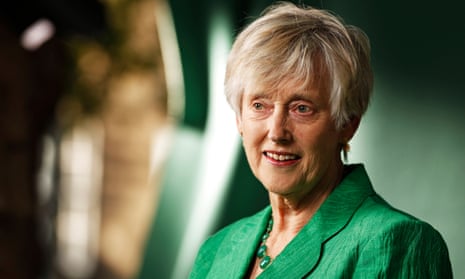The former head of MI5 Stella Rimington told the Edinburgh international book festival that after retiring from her job, she set herself a new mission – to “rescue spy stories from the blokes.”
Rimington, who joined the security service as a typist in 1968 and became its its first female director general in 1992, is following up last year’s Close Call by working on her ninth novel featuring heroine Liz Carlyle.
“When you think about it, all fictional spies are blokes, and spy writers when I started were chaps too. So I was certain that my character was going to be female. I wanted her to reflect accurately what a female does in my former service.”
Though she has previously been quoted as saying women make better spies than men, she now dismisses the idea as “rubbish”.
“People often say women make better spies than men. But of course that’s rubbish. Everybody behaves in a different way. Two men will behave differently and two women will behave in different ways … What you need in intelligence services is diversity. You need both sexes to bring that element of surprise. Women have certain different qualities, I think. Women are better at listening than men. Maybe they say less and listen more, and maybe their methods of persuasion are different. But in an ideal world you choose the best person for the job.”
Rimington, who chaired the Man Booker prize in 2011, also said the most unsafe she ever felt in her 28-year career was when her appointment as director general went public. With no press plan in place, she said, a tabloid chase forced her family to flee their “ordinary London street” to a block of flats. They took their dog and a suitcase.
“We had headlines like ‘Housewife super spy’ and suchlike. Who was this woman who’s holding a man’s job? They came round and took photographs of the house and that was the trigger to when we started feeling very unsafe. It was at a time when the IRA had active units in London. One of them was arrested and in their pocket they had this cutting of our house.
“That was the point I felt most unsafe. Here was me and Harriet, my younger daughter, exposed in a sense, without proper protection. We worked it out in the end and lived covertly for the rest of my time there, never getting letters to the house or anything like that. Harriet learned how to be a spy very quickly. She was 16.”
Elsewhere at the festival, as part of a music strand hosted by crime writer and uber-fan Ian Rankin, Edwyn Collins revealed that he was working on a new album.
The former Orange Juice singer, who suffered a crippling stroke in 2005, was accompanied on stage by his wife Grace Maxwell, who helped him play guitar as he sang two songs: Searching for the Truth and A Girl Like You, the 1994 hit that made his name.
They described how the 56-year-old singer had learned how to read again using books aimed at dyslexics, which they discovered from an independent Edinburgh publisher for dyslexic teenagers. “The condition took away reading, writing, everything,” Maxwell said. “He was having to do Ladybird books, it was crazy. Things like Janet and John. We wanted something with a bit of meat on it, so Barrington Stoke books were fantastic. They do books for young people with dyslexia … on a particular coloured paper, they choose the font size and spacing very carefully. It worked brilliantly for Edwyn.”
Corrresponding on social media had also played a part in his recovery. “He had his stroke at the right time, just when social media was starting,” said Maxwell. “As much as I have an ambivalent relationship with it sometimes, for Edwyn it’s been an amazing, wonderful thing. I always say, to anybody in the world, ‘Edwyn is sitting there on Twitter waiting to talk to you day or night.’”
This article was amended on 28 August 2015 to correct the spelling of “previously”.

Comments (…)
Sign in or create your Guardian account to join the discussion